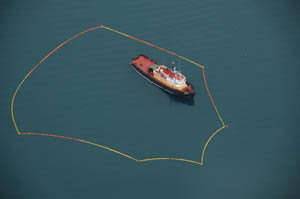The captain of a tugboat that struck an Alaska reef admits playing computer games while the boat was on its collision course.
Pathfinder ran into Bligh Reef and spilled 6,410 gallons of fuel into Prince William Sound on Dec. 23, 2009. The vessel was finishing an ice-patrol watch outside of the main navigation channels and was preparing to sail back to Valdez, Alaska, when the captain botched an autopilot setting, the U.S. Coast Guard said in an investigative report.
In June 2012, the captain pleaded guilty to a federal Clean Water Act violation. Ronald Monsen, 63, was sentenced to six months of home confinement and three years’ probation. Judge Deborah Smith said Monsen was grossly negligent.
While preparing to head back to Valdez, Monsen altered the pre-programmed GPS course by skipping two waypoints that would have kept the 5,650-hp tug on a safe course. When that new course was engaged, it sent the twin-screw boat directly toward Bligh Reef, Acting U.S. Attorney Kevin Feldis said. The captain pushed the throttle full ahead.
“Monsen did not chart his position or attempt to determine his exact location via GPS or any other method … and did not recognize that he had just set a course that was taking the Pathfinder directly into the reef,” Feldis said.
“Monsen moved away from the controls and walked to the bridge computer that was located on a separate workspace, facing away from the controls of the vessel,” he said. “As the vessel headed directly toward the reef, Monsen checked his e-mail and schedules and played computer games. He did not check the vessel’s location or the location of the reef in relation to his course. The vessel was left on autopilot and no one was at the controls.”
The failure to maintain a lookout due to personal use of the computer violated policies of Pathfinder operator Crowley Maritime Corp., the Coast Guard’s report said.
Any unnecessary use of electronic devices in the wheelhouse can hamper a mariner’s alertness.
“Games, music, phone calls to far away family are a strong temptation and could easily distract a ship’s officer from maintaining a proper lookout,” the investigators wrote.
The Coast Guard investigators also cited a lack of cooperation and poor communication between the captain and the second mate. The report said the Pathfinder officers were sloppy in the way they noted fixes. The captain did not confirm exactly where the 136-foot vessel was.
“The fact that he didn’t have enough information to determine the vessel’s position and failed to chart his intended course made this decision an unsafe act that resulted in the grounding of the vessel,” the report said.
The Coast Guard said operators should use a standardized method of noting navigational fixes and chart markings. Officers should clearly identify the method used, such as dead reckoning, global positioning or estimated position.
“At the time of the grounding, there were several marks on the Pathfinder’s chart that were all dissimilar,” the Coast Guard said. “When questioned about the markings on the chart, the second mate stated that each conning officer had his own symbol for a fix, and pointed out his fix signature.”
That haphazard method risked “confusion as to who took the fix, when the fix was taken, or what means was used to acquire the fix,” the report said.
The grounding tore open a diesel tank. Monsen was charged with unpermitted discharge into U.S. waters under the Clean Water Act, according to the U.S. Environmental Protection Agency. His sentence included a $15,000 fine and 50 hours of community service. The Coast Guard revoked his merchant mariner’s license.
Monsen had 33 years’ experience as a mariner — 10 years on Pathfinder — and was near retirement when the accident happened. He has indeed retired.

